 2022
Wildlife Crime Prevention
2022
Wildlife Crime Prevention
THE WCP

Wildlife Crime Prevention (WCP) Zambia was founded in 2016 and works across Zambia and southern African landscapes with partners to address wildlife and environmental crime and its impact on communities. We work across the crime continuum to reduce illegal wildlife and timber trade, strengthen effective investigation and prosecution, and raise public awareness.
By the close of 2022, WCP Zambia was supporting 30 Zambian law enforcement units, monitoring 56 courts, implementing six campaigns and has Memoranda of Understanding with four Zambian government departments (Department of National Parks and Wildlife, National Prosecution Authority, Drug Enforcement Commission and Zambia Correctional Services). This makes us the only NGO to be working nationwide across Zambia with this remit.

The WCP vision 1 Introduction 2 Communities and law enforcement Law enforcement 4 Protect the pangolin: rescue, rehabilitation, and release 18 WCP awareness programme 20 What’s next for WCP 26 WCP partner testimonials 16 Capacity building and mentoring 14 Acknowledgements 28 Wildlife Crime Prevention Alinea – WCP’s regional collaboration programme 12 Wildlife criminal justice programme 9 Partnerships and collaboration 11 WILDLIFE CRIME PREVENTION IMPACT REPORT 2022 1
The United Nations has identi ed climate change and biodiversity loss as major global challenges. In 2015, the UN adopted the 2030 Agenda for Sustainable Development, which includes the Sustainable Development Goals (SDG).
SDG 13 focuses on climate action, while SDG 15 focuses on life on land and specifically aims to protect, restore, and promote the sustainable use of terrestrial ecosystems, sustainably manage forests, combat desertification, halt and reverse land degradation, and halt biodiversity loss.
In addition, the United Nations Office on Drug and Crime (UNODC) has identified illegal wildlife trade as one of the most profitable forms of transnational organised crime, with an estimated value of up to $23 billion per year. The UNODC has also highlighted the social and economic impacts of illegal wildlife trade, including its links to corruption, money laundering, and other forms of organised crime. In WWF’s Living Planet Report 2020, WWF warns that wildlife populations around the world have declined by an average of 68% since 1970, with habitat destruction, overexploitation, and illegal wildlife trade among primary drivers of this decline. Additionally, all these issues have significant social and economic impacts, exacerbating poverty, inequality, and social justice.

Post-pandemic, in 2022, WCP Zambia widened its outlook to include climate change as a vital component of addressing wildlife and environmental crime and its impact on affected communities. As the global challenge of climate change impacts developing countries in the global south, Zambia is no exception and both wildlife and human populations will be affected.
Changes in climate pose challenges to Zambia's ongoing efforts to combat poverty, reduce food insecurity and sustainably manage natural resources. Climate projections in Zambia include increases in temperature and more extreme weather (intense precipitation, floods and droughts) and increased rainfall variability.
Climate changes will have key impacts on agriculture, water resources, human health, ecosystems, and energy and infrastructure. In protected areas reduced vegetation and water availability may lead to loss of wildlife or wildlife migration, causing increased potential for human wildlife conflict. As a result, efforts, to tackle the illegal wildlife trade, protect wildlife, wild spaces and the adjacent communities are vital climate change adaptation solutions. Human wildlife conflict solution efforts will become increasingly needed as the climate changes and wildlife and people are forced to share space and resources.
Climate change impacts will inevitably cause more rural poverty through land degradation and reduced agricultural productivity making involvement in the illegal wildlife trade a more tempting alternative (and perhaps the only alternative). More awareness of the legal penalties of wildlife crime and behaviour change efforts will be needed alongside alternative livelihoods to counteract this force.
To address these challenges, a coordinated and collaborative effort is needed from a wide range of stakeholders, including NGOs, government agencies, government leaders, the public, private sector, and communities. Each of these groups has a unique role to play in developing effective solutions to these challenges.
Conservation organisations and other not for profit organisations can play a critical role in raising awareness about these issues, engaging stakeholders, and mobilising support for action. They can also support the development and implementation of effective policies and programmes, provide technical expertise, and support capacity building efforts.
Government agencies and leaders play a key role in developing and implementing effective laws and policies, providing the resources and support needed to combat environmental crime, and promoting sustainable development practices. Government agencies and leaders can also work to promote transparency and accountability, promote public participation, and ensure that the voices and perspectives of local communities are heard and incorporated into decisionmaking processes.
The public can also play a critical role in addressing these issues. Individuals can advocate for policy change, engage in public awareness campaigns, and support NGOs and other organisations working to address climate change and illegal wildlife trade.
Finally, legal justice is a critical component in addressing the complex and interconnected issues of climate change and illegal wildlife trade. By developing and implementing effective legal frameworks, supporting law enforcement and other stakeholders in their efforts to combat environmental crime, and promoting social and economic justice, legal justice can help to protect the planet and promote the long-term sustainability of our natural resources.
The private sector can also play a significant role by investing in sustainable practices, engaging in partnership, supporting policy development, providing funding and expertise, and encouraging sustainable behaviour. By working together with government, NGOs and communities, the private sector can help address some of these challenges whilst also promoting sustainable economic growth and development.
Local communities are key stakeholders in efforts to address these issues. Communities can take an active role in protecting their environment and natural resources, promote sustainable development practices, and work to develop alternative livelihoods that respect the needs of both human and wildlife. By empowering local communities and building partnerships across different sectors and stakeholders, we can develop effective and sustainable solutions to these complex issues.
WCP is committed to working together with stakeholders and taking a coordinated and collaborative approach, through which we can develop and implement effective solutions to address climate change and illegal wildlife trade.
By promoting sustainable development practices, protecting natural resources, and promoting social and economic justice, we can build a more sustainable and resilient future for our planet.

WILDLIFE CRIME PREVENTION IMPACT REPORT 2022 3 2
AND LAW ENFORCEMENT
Wildlife law enforcement actions can play a critical role in protecting local communities, particularly those that are more vulnerable to the impacts of illegal wildlife trade. Wildlife crime can have significant social and economic impacts, including loss of livelihoods, displacement, and human rights violations.
By enforcing laws and regulations that protect wildlife, law enforcement agencies can help to protect local communities from the negative impacts of crime.
In addition, law enforcement actions protect local communities by preventing the loss of natural resources such as forests, wildlife and fish stocks. Illegal wildlife trade and other forms of environmental crime can threaten these resources, leading to the loss of livelihoods and economic opportunities now and in the future. By enforcing laws that protect wildlife and their habitats, law enforcement agencies can help to ensure that these resources are more sustainable and benefit all Zambians through sustainable resource use which include tourism. Wildlife law enforcement actions help to protect the rights and wellbeing of vulnerable and marginalised communities. Many communities are particularly vulnerable to the impacts of environmental crime, by protecting the
rights of the communities, healthy and safe environments are ensured. It also helps promote social and economic justice by holding those responsible for environmental crime accountable for their actions. Illegal wildlife trade and other forms of environmental crime often involve corruption, money laundering that undermine their rights. By enforcing laws and regulations that protect wildlife, law enforcement agencies can help to prevent these illegal activities, promote transparency and accountability, and ensure those responsible are held accountable for their actions.
Therefore, wildlife law enforcement plays a critical role in protecting local communities, particularly those that are more vulnerable to the impacts of illegal wildlife trade. By protecting natural resources, promoting social and economic justice, and protecting the rights and well-being of local communities, wildlife law enforcement actions can help to build a more sustainable and equitable future for all.
Law enforcement
WCP has continued to make significant strides to combat illegal wildlife trade (IWT) through supporting law enforcement efforts in Zambia.
In partnership with the Department of National Parks and Wildlife (DNPW), WCP focuses on building the capacity of the Intelligence and Investigation Units (IIUs), expanding the Rapid Deployment Teams, and fostering strong institutional partnerships with local NGOs and government departments.
In recent years, WCP has successfully strengthened IIUs’ capacity to move up the criminal chain, leading to an increased number of national and regional syndicate members. This introduction of Rapid Deployment Teams and Detection Dog Unit has contributed to a significant increase in seizures and arrests throughout Zambia.

WCP aims to provide long-term and sustainable support to key government partners such as DNPW, National Prosecution Authority (NPA), Drug Enforcement Commission (DEC), Zambia Correctional Services (ZCS) and Forestry Department. This support includes operational resources, data analysis, capacity building, advocacy and support for effective prosecutions, and sentencing. It also fosters national and international law enforcement cooperation to disrupt IWT across a wider geographic area, increasing overall impact.
To address the multifaceted nature of IWT and its underlying root causes, WCP has adopted a regional approach that involves collaboration with key stakeholders. WCP works towards understanding socio-economic drivers of IWT, raising awareness, building competence, identifying best practices, and improving cooperation through regional forums for information exchange.

Overall, our approach involves addressing the multiple challenges related to climate change, biodiversity loss, and environmental crime with long-term, multi-agency coordination. By working together with our partners, we continue to provide effective solutions in Zambia and the region.
During 2022, WCP supported:

1 Detection Dog Unit
5 Rapid Deployment Teams
24 Intelligence and Investigation Units
WILDLIFE CRIME PREVENTION IMPACT REPORT 2022 5 4
In 2022, the reduction of the illegal ivory, pangolin, and big cat skins trade continued.




















WCP partners with North Luangwa Conservation Project, Conservation South Luangwa, Conservation Lower Zambezi, West Lunga Conservation Project, Nsumbu Tanganyika Conservation Programme, Panthera, Musekese Conservation, Game Rangers International and African Parks to monitor poaching trends and threats to Zambia's wildlife.









Over the last three years, elephant poaching and ivory seizures have reduced, with Zambia's elephant population being better protected in their natural habitats.
WCP, in partnership with the Zambian Carnivore Programme and Panthera, has made significant efforts to address the issue of big cat poaching and trade. WCP provided communications and data support to Panthera’s “Saving Spots” project with the Barotse Royal Establishment of the Lozi people, a conservation initiative in western Zambia that seeks to preserve rich cultural traditions while protecting declining wild cat populations using synthetic leopard, serval and lion furs. Since 2017, WCP and the Zambian Carnivore Programme have implemented a project that includes DNA sampling of skins seized from the illegal trade. This initiative aims to identify the origin of illegally
traded skins and enable better protection strategies on the ground. This project was rolled out through a regional Lion Bone Trade and Bushmeat Poaching project, funded by the Lion Recovery Fund. This initiative expanded across South Africa, Mozambique, Namibia, Zimbabwe, Botswana and Zambia, bringing together various partners such as the Mozambique Wildlife Alliance, Greater Kruger Environmental Protection Foundation, Niassa Carnivore Project, Rio Save Safari (Coutada 9), TRAFFIC, Rooikat Foundation, Carnivore Coalition Botswana, Endangered Wildlife Trust, Zambian Carnivore Programme, and Panthera.
While progress was made in several areas, there was a noticeable rise in bushmeat and firearms incidents. However, this issue was addressed through a targeted strategy, in close partnership with protected area partners, including North Luangwa Conservation Project, Conservation South Luangwa, Conservation Lower Zambezi, West Lunga Conservation Project, and African Parks. This comprehensive approach encompasses law enforcement, prosecution, and awareness-raising efforts, and is made possible by the support of multiple funding partners.

In 2022, there was a slight increase in rhino horn seizures, with the possible origin of these horns being Namibia and intended transit routes to the Democratic Republic of Congo. WCP maintains close collaboration with partners in both Namibia and the DRC.




In 2023, WCP will continue to work closely with the Department of National Parks and Wildlife (DNPW) and protected area partners to enhance the protection of areas with existing rhino populations in Zambia, as well as areas with potential for future rhino populations. The aim is to establish robust systems and enhance security measures outside of protected areas.








Results Suspects arrested 18 48 64 68 41 16 16 Weapons seized TOTAL 1,794 TOTAL 7,736 Livingstone DNPW Seizure 2022 2016 2017 2018 2019 2020 2021 2022 TOTAL 15.650 TOTAL 763 TOTAL 18 Leopard skins Cheetah skins Lion skins TOTAL 271 Big cat skins seized 70 60 50 40 30 20 0 TOTAL 58.696 COMMUNITIES AND LAW ENFORCEMENT (continued) 201620172018201920202021 2022 4441,2681,2731,6081,122889 1,132 158390468313187178 291 2 000 1 000 500 0 400 300 200 100 0 1 500 500 11 10 9 8 7 6 5 4 3 2 1 0 Bushmeat seized (tonne) 7.896 5.656 9.505 10.133 8.048 8.403 9.055 Ivory seized (tonne) 0.815 2.401 2.535 4.366 1.939 1.854 1.740 180 150 120 90 60 30 0 Pangolins seized 22 71 82 162 162 135 129 Rhino horns seized 0 0 3 3 4 8 0 15 42 56 53 34 12 11 2 1 2 1 0 1 0 1 5 6 14 7 3 5 TOTAL 223 TOTAL 7 TOTAL 41 WILDLIFE CRIME PREVENTION IMPACT REPORT 2022 7 6
The legal assistants facilitate various activities to support effective prosecutions.


These include:
Quarterly feedback meetings with DNPW to inform officers of court case progress so that they can understand how the evidence that the officers have presented has been received by the court and has impacted the outcome of the court case.
Prison monitoring visits to local prisons in each area with DNPW officers to verify the list of inmates quarterly.
Evidence security and management


WILDLIFE CRIMINAL JUSTICE


Magistrate Field Visits
13 visits
15 training
191 DNPW officers with



Working in partnership with the TRACE Network to strengthen the chain of custody of wildlife cases WCJ conducted a total of and 35 prosecutors.
Six solar powered evidence storage containers were installed at DNPW offices across Zambia: Mpika, Mfuwe, Mumbwa, Lusaka, Kalulushi and Livingstone, fully equipped with shelving, fridge, and closed-circuit television to ease evidence management and storage of exhibits. In 2023 we are working with DNPW nominated evidence custodians to ensure that the containers are well-maintained for the purposes of secure evidence management. The containers are now provided with labels, storage boxes, evidence bags and logbooks.
In 2022, WCP conducted to various national parks involving 53 magistrates from 44 courts, 34 prosecutors and 50 DNPW officers
This brings the total number of MFVs conducted since 2016 to 42.
The visits ensure continued judicial engagement with the NPA prosecutors and DNPW officers. They provide an opportunity for DNPW and NPA to get feedback from the judiciary on how cases are presented before them and for magistrates to appreciate the challenges in apprehending suspects.
From 25–28 October, 2022, DNPW, WCP Zambia and the Royal United Service Institute for Defence and Security Studies (RUSI) hosted a 4-day workshop under the theme, Case Closed? Using Historic Cases to Enable New Financial Investigations ‘Train the Trainer’ Workshop. The workshop was attended by various government institutions and the objective was to review and enhance financial investigation skills as they related to the predicate offence of wildlife crime.
Anti-poaching and other law enforcement efforts can be hindered in deterring crime, if cases are not successfully prosecuted, or if appropriate sentences are not applied. Effective prosecution contributes to the certainty element of wildlife crime deterrence and ensures that potential offenders are deterred by the likelihood of being punished accordingly (Akella, A.S. and J.B. Cannon (2004)).
Zambia has strong wildlife legislation enacted, with robust sentences for the illegal possession of valuable wildlife products and unlawful hunting of protected species (penalties of minimum 5 years and 7 years imprisonment respectively, up to 20 years and 25 years respectively, without the option of a fine).

WCP’s Wildlife Criminal Justice (WCJ) team is made up of nine Zambian lawyers who work as Legal Assistants with both DNPW law enforcement teams including anti-poaching and intelligence and investigations officers, public prosecutors (NPA) and magistrates across various activities.


Courtroom monitoring takes place in over 56 courts across the country to better understand what is happening to wildlife crime court cases once they enter the criminal justice system. Five years of data has now been collected to build up a better picture of outcomes and sentences across the country which is being used to identify weaknesses as well as solutions.
IN TOTAL, IN 2022: 618
new wildlife crime court cases throughout Zambia were monitored
Of the monitored offences in 2022 (n=1,390), 829 have concluded and resulted in:
84% 78% CONVICTED OFFENCES 699

JAIL SENTENCES

546

Legal assistants also provide mentorship for more effective prosecutions to officers and prosecutors including facilitating pre-trial conferences, docket review, case-building, evidence presentation, and submission drafting for aggravated sentencing. A Rapid Reference Guide for the Investigations and Prosecutions of Wildlife Crime in Zambia has been produced in direct consultation with DNPW and NPA and has been rolled out across the country to improve understanding and communication between officers and prosecutors.
Judicial engagement with magistrates through field visits to national parks promotes their better understanding of the practical context of cases and the value of PAs and wildlife populations. This work has so far resulted in an increase of the conviction rate for wildlife crime court cases from 63% in 2017 to 84% in 2022. However, there remain urgent issues to address on which the WCJ team continues to work. Innovative solutions have been developed in partnership with NPA such as the Guidance for Impact Statements for Wildlife Crime Sentencing being implemented to ensure recognition of degree of criminality in sentencing. Victim Impact Statements were created as an opportunity for the Judge to hear how the criminal offence has affected a victim. In wildlife cases the “victim” of the offence is not only the animal that has been killed, but the nation that has suffered economic and environmental loss as the death of that animal affects the entire eco-system. In wildlife crime cases, prosecutors can draft impact statements on behalf of the “victim” based on this guidance. The guidance provides a list of examples that may be used by prosecutors in the presentation of impact statements to the court at the sentencing of wildlife crime convicts. The impact statement is meant to inform the Magistrate or Judge of the impact on the environment and the county at large that has been occasioned due to the actions of the convict, which can then be considered in sentencing.

COMMUNITIES AND LAW ENFORCEMENT (continued) WILDLIFE CRIME PREVENTION IMPACT REPORT 2022 9 8
During 2022, the average custodial sentence for high value wildlife product sentences continued to increase above the minimum:
The legal assistants have also started to build relationships with other law enforcement agencies such as immigration, drug enforcement commission and Zambia revenue authority as indicated by the number of times that members of other law enforcement agencies have reached out to the team and asked for collaborations in the prosecutions of cases.
The conviction rate continues to incrementally increase since WCP started working in this area and is one of the strongest in Southern Africa.
AND COLLABORATION

ELEPHANT IVORY 61 months LEOPARD SKIN 60 months

PANGOLIN 60 months

In 2022, conviction rates increased markedly in some areas and overall, nationwide as DNPW ensures that dockets submitted to NPA contain all relevant documents, such as warn and caution statements and identification certificates. Open communication between the two departments enables sharing of case details and developments. This progress can be attributed to the role that the WCP legal assistants have played in building capacity and the relationships between these two departments. High profile criminals are now being convicted and sentenced appropriately instead of falling through the cracks.
After five years of activities such as rapid reference guide workshops, magistrate field visits, docket reviews, pre-trial conferences, and ongoing mentorship from legal assistants, the legal programme has had a positive impact on the effective prosecutions and appropriate sentencing of wildlife crime in Zambia.

It is also positive to see more deviation from the minimum sentences from magistrates. The average sentence for ivory is now over five years and for rhino horn over six years.

Courts monitored by Legal Assistants
RHINO HORN 72.5 months







Conservation efforts require the involvement of a wide range of stakeholders, including government agencies, NGOs, local communities, the private sector, and the public.
By working together, organisations can combine their expertise and resources to identify root causes of problems and develop effective solutions. Collaboration can also help organisations access resources needed for conservation efforts and engage stakeholders in conservation initiatives. Overall, collaboration is critical to the success of conservation organisations, enabling them to make a greater impact in protecting the environment and preserving biodiversity for future generations.

Close collaboration with government agencies, especially in law enforcement, is crucial for protecting wildlife and their habitats. Government agencies have the mandate to enforce laws and regulations related to wildlife protection and habitat conservation. This collaboration can take various forms, including sharing information, developing joint enforcement operations, and supporting capacity building for law enforcement officials. Such cooperation can help combat wildlife trafficking, policy change, illegal logging, environmental crime, and provide increased protection to people and landscapes.
Working with communities is vital for ensuring meaningful social impact, as they often live near or depend on natural resources and have a deep understanding of the local environment. Building trust, fostering collaboration, and promoting more effective conservation outcomes can be achieved by involving communities in conservation planning, engaging them in conservation efforts, and providing education and health support. Conservation initiatives can also address social issues like poverty, inequality, and conflict. It is essential to work closely with communities to identify and address these issues for the benefit of both conservation and local community development.
Regional collaboration across multiple borders is especially important in conservation efforts because environmental issues often transcend national boundaries. Many ecological systems, such as watersheds, migratory routes, and ecosystems, cross borders, requiring coordinated efforts across multiple jurisdictions. Regional collaboration allows conservation organisations to pool resources, share information and expertise, and develop coordinated strategies for conservation. Working collaboratively can help ensure conservation efforts are aligned with the needs and priorities of conservation, wildlife, and local communities across these boundaries.
Information sharing is particularly crucial in regional collaboration, as it can be challenging due to multiple jurisdictions, laws and policies, large landscapes, and differing resources or priorities. Ensuring regional partners are well or similarly equipped and resourced is vital to addressing the illegal wildlife trade. Identifying and fostering multiple interactions can support cross-border collaboration, ensuring greater security for both wildlife and people.
WCP works closely with the following organisations outside of Zambia to scale impact and improve increase protection across large landscapes for wildlife and people: Rooikat (Namibia), Mozambique Wildlife Alliance (Mozambique), Niassa Carnivore Project (Mozambique), Gonarezhou Conservation Trust (Zimbabwe), Victoria Falls Wildlife Trust (Zimbabwe), Greater Kruger Environmental Protection Foundation (South Africa), Sabi Sands (South Africa), TRAFFIC (Zambia and Regional), C4ADS (USA), Department of Wildlife and National Parks (DWNP) (Botswana) and Conserv Congo (DRC).


Collaboration is essential in conservation due to the complex nature of the issues and the need for a multidisciplinary approach.
WILDLIFE CRIMINAL JUSTICE PROGRAMME (continued) WILDLIFE CRIME PREVENTION IMPACT REPORT 2022 | 11 10
ALINEA
–WCP’S REGIONAL COLLABORATION PROGRAMME
Across the spectrum of conservation, including conservation law enforcement; numerous processes, ideological and political influences towards conservation, communities, law enforcement, and varying approaches of counter wildlife crime at local, national, and regional levels are present. Whilst differing approaches to similar problems are sometimes beneficial, what is lacking across Africa is a fusion of purpose and local adaptation of international best practice systems and procedures.
This results in capacity shortages to tackle a variety of challenges, displaces crime to areas with weaker law enforcement and reduces coordinated geographical protection against a threat that capitalises on weak institutions, concealment amongst disenfranchised populations and uid movement of illegal commodities. At the forefront of this challenge is the lack of adequate presence and alignment of organisations under a truly uni ed purpose. Despite some countries having highly capable NGOs to support this effort, many areas lack the funding, technical expertise, and capacity to deal with ever changing threats; compounded by the fact all NGOs require to be competitive and already established to attract funding, leaving smaller yet capable organisations with insufficient resources to adequately counter IWT and other conservation challenges in their areas.
To address these challenges, Alinea has been established as part of WCP to provide a conduit of support to NGOs across Southern Africa and to align organisations to a common purpose in conservation. In addition to addressing speci c challenges for NGOs regionally, Alinea serves to share best practices and procedures at the grassroots level to organisations, to encourage new working models, and provide support that allows NGOs to focus on work that provides positive impact to conservation and communities.
Alinea encourages new ways of working in conservation, innovation and alignment of organisations and affiliates under common purpose. To achieve this, WCP has acknowledged the need to support NGOs and Non-Government Individuals (NGIs) and Other Government Organisations (OGAs) across Southern Africa to improve their ability to support a variety of conservation roles by developing regional counter wildlife crime conservation efforts through the following pillars:
In line with Alinea's pillars, the Alinea programme provides support to current and future partners through the following six strategies:
1 Capacity Building
Identify capacity gaps amongst willing partners and address gaps through capacity building, including focused training and mentoring across a range of disciplines. This also includes finding the appropriate Subject Matter Experts (SME) to assist in addressing a wide variety of capacity gaps and future solutions.
Mentoring
2








Mentor key individuals to develop capacity for future growth, and to improve partners’ all-round capabilities.
3 Financial and Resource Assistance





Help core finances, projects, and other resources with partners, to ensure strategic development.
4 Specialised Support














5 Advocate
Provide specialist SME support to partners in a broad range of skills and disciplines, with a focus on functional and achievable actions in a local context.
Change behaviours towards conservation across Africa, including increasing positive exposure of organisations to change conservation narratives, under a unified purpose.

6 Mutual Support
Supporter Connector Promoter
• Support and strengthen affiliates in Southern Africa that share common goal(s)
• Enable learning networks through peer exchange
• Support new perspectives, pilots & prototypes to inform & in uence operating models.
• Align IWT, community and development agencies at landscape level












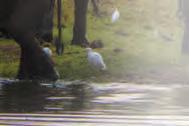







• Encourage creation and adoption of new models where appropriate.
•Expand knowledge of new operating models
• Convene non-traditional experts to inform and adapt models
• Advances/encourage government champions.
Utilise a large network of NGOs and NGIs to provide support to each other’s objectives, to learn from successes and failures and to build resiliency to promote growth.
The purpose of the regional programme is to provide grassroots organisations with the capacity to become independent and to operate in unison with partners across Africa. As each organisation differs in approaches, matched with differing levels of complexity in their operating environments, placing timelines on an organisation’s development and independence does not allow flexibility. The implementation of the above strategies relies on the
continual focus on developing partner organisations to achieve their desired objectives, balanced with partners conducting the actual work that is required. Further, each organisation is different from the next, with only so much room for standardisation across regional partners. As such, the implementation of this strategy is based on critical events planning towards organisational independence of partners.
Increase Capabilities Increase Network Increase Resources Improve Security Ensure layers of support and protection
WILDLIFE CRIME PREVENTION IMPACT REPORT 2022 13 12
SECURITY GUIDANCE TRAINING and advice provided to 5 organisations in 4 countries
WILDLIFE CRIMINAL JUSTICE ADVICE provided to 3 organisations in 3 countries

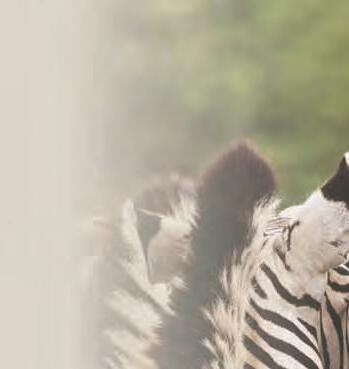
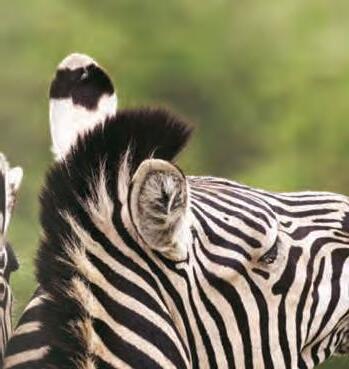

CAPACITY BUILDING AND

CAPACITY BUILDING ON TECHNOLOGY provided to 3 partners in 3 countries
Cortex Edge Training
Capacity building and training provided by WCP to partners in 2022 included Semantica AI/Cortex Edge software and analysis, investigations and operations guidance and other specialty skills to assist partners in combatting Illegal Wildlife Trade in their countries and focus areas.
Of note has been the provision of Cortex Edge (produced by Semantica AI) software and associated training to expand the analytical capacity of organisations and to increase the standardisation of databasing and analysis across conservation Law Enforcement. This standardisation promotes future information sharing platforms due to commonality of procedures, information security and ensuring usefulness and timely access for cooperating partners to support each other.
CORTEX EDGE BASIC USER TRAINING provided to 40 people across 16 organisations in 7 countries
INVESTIGATIONS GUIDANCE provided to 7 organisations across 4 countries
STRATEGY SUPPORT AND GUIDANCE provided to 4 organisations in 3 countries
ATTENDANCE of 10 regional level counter IWT meetings and workshops in 4 countries
REGIONAL ANALYST LAW ENFORCEMENT PLATFORM MEETING held in Lusaka
4 organisations from 5 countries
MENTORING SUPPORT TRIPS

4 countries with 5 organisations
TOTAL FUNDING RAISED FOR PARTNERS IN 2022 USD1.9 million
ORGANISATION AND SOCIAL SAFEGUARD POLICY advice and development to 3 organisations in 3 countries
NUMBER OF PARTNERS RECEIVING FINANCIAL SUPPORT 9
NUMBER OF ORGANISATIONS RECEIVING TECHNICAL SUPPORT 16
FINANCE SYSTEMS AND ORGANISATIONAL GOVERNANCE support provided to 4 organisations in 3 countries

WILDLIFE CRIME PREVENTION IMPACT REPORT 2022 15 14
WCP PARTNER

WCP came online to fulfil a critical supporting role to our Law Enforcement effort which has exceeded expectations. Their adept, consultative and professional approach has forged strong relationships and their impact is irrefutable. This partnership has contributed to regional stability by galvanising key players in mitigating wildlife crime.
Working with WCP is the epitome of team efforts when it comes to the fight against the scourge of wildlife trafficking. The support they disseminate to other small, local organisations is what is needed in pushing the agenda of collaborative conservation. Besides the emotional support and capacity building, they go an extra mile on empowering other local organisations to be stronger and more independent, thus creating a climate of accountability and good governance in the conservation sphere.
Adams Cassinga Conserv Congo –Democratic Republic of Congo


CLZ is proud to be a partner of Wildlife Crime Prevention and to collaborate on several projects including WCP's Judicial Programme, a pangolin release and tracking project, and as part of the Save Zambezi Safe Zambezi Campaign.
CLZ and WCP have worked successfully together since 2015 to support the criminal justice system of the Lower Zambezi region in close collaboration with the Department of National Parks and Wildlife (DNPW) and the National Prosecutions Authority (NPA). CLZ and WCP's Legal Assistant monitors wildlife crime court cases to provide technical and logistical support and track prosecutions in the area, which led to 80 cases being monitored and a conviction rate of 84% in 2022.


One of our key conservation partners in South Luangwa is Wildlife Crime Prevention. Collaboration is key in our mutual fight against wildlife crime and leaning on each other's skills, knowledge and experience enables us to maximise resources and the opportunity for success.
Rachel McRobb
This expressed value stretches beyond the financial support received, and includes the broader relationships built, the collective efforts which support the combatting of IWT in a regional manner, the mentorship offered, the promotion and implementation of effective communication channels and the training offered to broaden skills within the GKEPF team.
To MWA, WCP represents a lot more than just one partner organisation. MWA exists, in a large part, because of WCP. WCP believed in what was just a concept in a country and a reality where concepts usually fade and do not materialise. WCP invested in it, dedicated time, money, reputation, and more importantly friendship. Provided guidance, training, shared its failures, difficulties and hurdles, so that MWA could avoid them. In an self-centered NGO world increasingly driven by hunger for success, where competition is a threat to institutional survival, WCP did all of the above, with no agenda other than supporting MWA’s development, and its not stopping! WCP continues to dedicate its time and resources to travel alongside MWA, leading the way into the unknown!!
Joao Almeida Mozambique Wildlife Alliance

DNPW, WCP, and CLZ have also worked together for several years to release pangolins that have been rehabilitated by WCP and DNPW. In 2022, a programme to track confiscated pangolins post-release began: the first programme of its kind in Zambia. This programme's goal is to monitor their progress and improve our protocols so that these incredible creatures are given the best chance to survive.
CLZ and WCP are also part of the Save Zambezi Safe Zambezi campaign made up of several concerned organisations and individuals hoping to stop the construction of a mine inside the Lower Zambezi National Park. More than 50 stakeholders, not-for-profit organisations, and artists have banded together to petition the government to stop this mine through the Save Zambezi, Safe Zambezi campaign with a petition that has been signed by over 50,000 people.
Through the Alinea programme, WCP has brought together a diverse group of organisations with aligned goals and this has been invaluable to GKEPF. The information and experiences shared through this programme addressed an incredible void in the collective approach to combatting IWT. WCP shares lessons learnt openly and honestly, and the WCP team is always available to brainstorm challenges with GKEPF. Their experience has made a significant difference in the way GKEPF structured some of its projects and this has saved us both time and valuable resources.
As CEO of GKEPF, I cannot thank you enough for WCP’s interest and trust in GKEPF as an organisation. In addition, the leadership style is unique and highly commendable especially in the tumultuous world of conservation NGOs. In closing, I would like to thank you for the vision, drive, ethical conduct and above all for becoming a partners in the conservation space.
 Ian Stevenson Conservation Lower Zambezi
Ian Stevenson Conservation Lower Zambezi
 Gonarezhou Conservation Trust Frankfurt Zoological Society
Conservation South Luangwa
Gonarezhou Conservation Trust Frankfurt Zoological Society
Conservation South Luangwa
WILDLIFE CRIME PREVENTION IMPACT REPORT 2022 17 16
Sharon Haussmann Greater Kruger Environmental Protection Foundation
RESCUE, REHABILITATION, AND RELEASE
Since 2016, WCP has supported the seizure of 763 pangolins from the illegal wildlife trade through our support to the Department of National Parks and Wildlife. As the pangolins are more valuable to the end consumer alive than dead, many are rescued alive by wildlife authorities. However, their time in the hands of criminals often leaves them malnourished, injured and weak. The WCP pangolin rehabilitation centre provides treatment and care to give these sensitive animals the best chance of a successful release back into the wild.
The WCP Protect the Pangolins programme is managed by Suwilanji Sichone, Pangolin Programme Coordinator. Suwilanji is a veterinary technician from the University of Zambia with a growing, grassroots understanding of pangolin behaviour and ecology. Her understanding of their rehabilitation requirements is unparalleled in Zambia.
The pangolin rehabilitation centre is in a 650-hectare game reserve of unspoilt grassland and woodland that is renowned for its pristine trees as well as being home to more than 500 plains animals. This location is kept private for security purposes, and it is not open to the public.

Through WCP’s law enforcement support to the DNPW we receive reports of pangolin seizures from the illegal trade across Zambia. Suwilanji assesses each rescued pangolin’s condition either in person or remotely through criteria such as weight, behaviour and posture and supports DNPW in deciding to either release back to the wild immediately or bring the animal in for treatment or monitoring.
If the pangolin is brought to the centre it is immediately assessed for wounds or illnesses and treated appropriately. These animals are often high traumatised and fearful, so great care is taken to treat the pangolin as gently as possible. Female pangolins are also checked with an ultrasound for pregnancies. Blood and stool samples are taken and analysed through the University of Zambia labs to ascertain if there are any infections or parasite loads. While at the centre, the animals are allocated a specific keeper, to minimise human interaction, and are taken out for foraging and drinking twice a day when they awake.
Once a pangolin has recovered from any wounds or illnesses, has attained a sufficient weight gain, and has a healthy body condition and posture steps are made to release the animals back into the wild as close as possible to its original location (if known).

So far, the project has released

94 pangolins

into the wild after rehabilitation.

Pangolins are the most trafficked animal in the world and Zambia’s pangolin population of Temminck’s Ground and White-bellied Tree Pangolins is no exception to this onslaught.
Many thanks to the DNPW Veterinary Department for their partnership; UNZA for all their assistance; Conservation Lower Zambezi, Tikki Hywood Foundation, African Pangolin Working Group, IUCN Pangolin Specialist Group, The Pangolin Project, Pangolin Conservation & Research Foundation, our protected area partners for helping with releases, the Miller family, and our donors for this project: the Oak Foundation and the Pangolin Crisis Fund.
WCP would like to thank partners who have helped us to care for Zambia’s pangolins.
A pilot project tagging release individuals with VHF and GPS trackers commenced last year to better understand their distribution and survival rates after release.
back
WILDLIFE CRIME PREVENTION IMPACT REPORT 2022 19 18
Photo credit: Estella Snowden
The future of protected areas in Zambia and Southern Africa ultimately relies on public support. Therefore, creating greater awareness, access and ownership of these areas and their wildlife populations is crucial for their long-term survival.
2
THIS IS NOT A GAME: Behaviour Change Campaign Against the Illegal Bushmeat Trade


TELEVISION
17 bushmeatthemed episodes
of the popular telenovela, Mpali. Estimated viewers
1,7 million
Five years ago, WCP in partnership with DNPW launched Zambia’s first behaviour change campaign focussing on the illegal bushmeat trade. This Is Not a Game is Zambia’s ground-breaking behaviour change campaign against the illegal bushmeat trade and has inspired the nation to change consumption habits. Five years on, the campaign has leveraged a growing social media audience in Zambia and social media influencers while also using traditional media distribution channels such as television, radio, billboards and activation events.
WILDLIFE CRIME PREVENTION
In recognition of this, WCP has put raising public awareness of the illegal wildlife trade and conservation issues, at the heart of its work. By partnering with DNPW and using media and behaviour change campaigns, we focus on specific consumer groups to convey important conservation messages.

WCP believes the conservation narrative in Zambia should be discussed publicly and not just in exclusive scientific or academic circles to encourage ownership and make conservation part of the wider national narrative.
Wildlife Crime Press Coverage

46 press releases about wildlife crime and related issues were published on various media
BILLBOARDS
A large billboard was erected on the side of one of Lusaka’s busiest roads for 6 months. On average
18,000
vehicles passed this location per day.
MEDIA ENGAGEMENT
11 Zambian Journalists trained on illegal bushmeat trade reporting in Zambia.

SOCIAL MEDIA
1,176,250
people were reached on Facebook and Instagram
RADIO
20 national newspaper articles published

3
LEGAL GAME
MEAT OUTLETS

24 outlets located in
6
provinces are supported in partnership with the Wildlife Producers Association of Zambia.
7,560,291
12 episodes of a 15-minute radio programme on the dangers of illegal bushmeat reached people on 6 radio stations throughout Zambia.
TEACHER TRAINING WORKSHOP
32 teachers in the Lower Zambezi area were trained on how to educate students about the illegal bushmeat trade –in partnership with Conservation Lower Zambezi.
PROTECT THE PANGOLINS BEHAVIOUR CHANGE CAMPAIGN:

Baseline Study
In 2022, WCP commenced a baseline study into the drivers of the illegal pangolin trade in Zambia to inform a potential behaviour change campaign. Ethical clearance for the study has been obtained from the Copperbelt University and survey tools have been created.
The team has developed three survey tools to be used to gather data from identified key stakeholder groups including convicts, law enforcement officials and local communities in pangolin trade hotspots. Thus far household surveys and focus group discussions have been conducted.
1
WILDLIFE CRIME PREVENTION IMPACT REPORT 2022 | 21 20
TO DATE
546 people have joined the W4C network
Women For Conservation

Women for Conservation (W4C) is an inclusive network for all gender equality supporters who work in or are interested in wildlife conservation in Zambia. Our events provide an opportunity for women who are interested in conservation to engage with conservationists who are often based at remote field sites to learn more about their work and the challenges they face.
In 2022, we hosted 4 events:
• A nature walk in Lazy J’s Sanctuary
• Campfire Stories: Mentorship and Smores
• Women for Conservation Post Earth Day Talk

• Launch of the 2022 Mentorship Cohort
NETWORKING EVENTS HELD
16
VISITS TO PROTECTED AREAS
5
Programme manager, Luwi Nguluka has also provided support for a similar organisation in Botswana, led by veteran conservationist, Glyn Maude.
The W4C Mentorship Programme

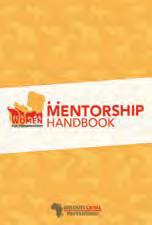

In June 2020, WCP launched the W4C Virtual Mentorship Programme. The programme comprises highly respected Zambian and international conservationists each of whom agreed to mentor a young Zambian early career conservationist. Each mentor agreed to monthly meetings with their mentee over a period of six months during which they shared their knowledge, expertise, and experience. WCP has produced a W4C mentorship handbook to be used as a guide for this process.
5
PARTNERSHIPS with over
Conservation Careers Fair


Wildlife Crime Prevention held its annual Conservation Careers Fair (CCF) in partnership with the National Institute of Public Administration (NIPA) at the NIPA Conference Centre in Lusaka on September 8, 2022. The fair, now in its fifth year, recorded a mass turnout. Potential employers from 20 conservation organisations across the country joined over 600 students from the country's highest training institutions. The Conservation Careers Fair is an unmissable event in Zambia’s conservation calendar providing an opportunity for students to not only meet potential employers but also listen to talks by prominent conservationists and receive training from recruitment experts.


The Acting Director of the Department of National Parks and Wildlife (DNPW), Andrew Chomba officially opened the event and stated his pride in seeing such events being hosted for young Zambians. Content generated on all social media platforms reached people across the globe including the United Kingdom, the United States of America and Israel.

PEOPLE REACHED on Facebook, Instagram and LinkedIn
123,786
NEW FOLLOWERS ON SOCIAL MEDIA
1677
well-respected conservation organisations
Project manager Maina Malaya is a certified trainer in women’s leadership and empowerment.

In 2022 we launched our second mentorship cohort with 14 mentors committed to coaching one earlycareer conservationist each for six months.
290 CONSERVATION JOBS on the conservation careers Zambia website


Kachama Banda
It has given me a lot of confidence to carry on with my career. I joined the programme just when I didn’t feel my best at work and felt I had outgrown the role. I had at the time. My mentor came in just when I needed guidance and support from someone who’d understand my situation. I have now taken on my career with confidence and the right mindset. Thanks to the mentorship, I went through.
Blessing Samalesu
“I found it valuable to be able to talk to someone who’s walking the path I want to take. It was so nice to be able to relate with someone. I must say since then, I have been promoted and that’s exciting.”
4
5 WILDLIFE CRIME PREVENTION AWARENESS PROGRAMME (continued) WILDLIFE CRIME PREVENTION IMPACT REPORT 2022 | 23 22
WORTH MORE ALIVE






Kenneth Kaunda International Airport Campaign: “Worth More Alive”



On 17 August 2022 WCP, DNPW and the Zambian Airports Corporation Limited launched the “Worth More Alive” campaign. Life-size animal sculptures and posters were installed to prevent wildlife trafficking through international airports in Zambia by providing information to travellers on the importance of wildlife in Zambia, its protection and the legal penalties applicable to offenders. The campaign also provides information to the public on how to recognise and report suspected wildlife crimes to the relevant authorities.





The “Worth More Alive” campaign is more than just sculptures and posters in this airport. It is the physical representation of the principles passed on to us by our forefathers. Dr Kenneth Kaunda, after whom this airport is named, was a firm believer in the need to conserve our wildlife. He was a true conservationist who believed in sustainable management of natural resources to better the lives of the people who live with it. In the conservation community, we often talk about the Chongololo clubs, their legacy and how he fought for them to be established and integrated into all schools in Zambia. Like those clubs “Worth More Alive” for every Zambian.
Illegal Wildlife Trade Journalism Training; Visit to South Luangwa National Park 7



From 24–26 May 2022, Eleven journalists from eleven different media houses in Lusaka, Katete, Chipata and Mambwe were given the opportunity to learn more about the conservation activities occurring in South Luangwa and the various organisations behind these activities.
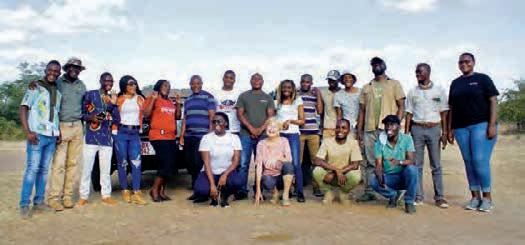



Journalists returned with a better understanding of complex nature conservation issues such as poaching, encroachment and humanwildlife conflict.

6
The visit also linked journalists to WCP’s key conservation partners in the region, namely, Conservation South Luangwa, Chipembele Wildlife Education Trust and the Zambian Carnivore Programme.
“ILLEGAL WILDLIFE TRADE IN THE AVIATION INDUSTRY” TRAINING trainings held at Zambia’s four international airports. 5 AIRPORT STAFF TRAINED across the country on how to identify illegal wildlife products in Zambia’s airports and how to prevent the trafficking of said products. 224 LIFE-SIZE WILDLIFE INSTALLATIONS with accompanying awareness materials. 3 POSTERS at Zambia’s four international airports. 19 WILDLIFE CRIME PREVENTION AWARENESS PROGRAMME (continued) WILDLIFE CRIME PREVENTION IMPACT REPORT 2022 | 25 24
Forestry
WCP recognises the crucial role of forests in conservation and combatting climate change. The organisation plans to expand its efforts in forestry conservation, promoting sustainable practices, and mitigating deforestation. WCP will seek an MoU with the Forestry Department for capacity building, justice, and awareness support.
WHAT’S NEXT FOR

Crime Convergence
WCP acknowledges the interconnected nature of wildlife crime with other forms of criminal activities. By strengthening partnerships with law enforcement agencies and international organisations, WCP aims to address crime convergence and disrupt criminal networks involved in a variety of environmental crimes. In Zambia, this will be achieved through the development of a joint operational task force.

Project Safe Passage
WCP is committed to implementing Project Safe Passage, which aims to safeguard wildlife corridors and promote the safe movement of wildlife across multiple landscapes. By collaborating with local communities, government entities, and other stakeholders,WCP strives to mitigate human-wildlife conflicts and ensure the continuity of vital wildlife landscapes through a multitude of approaches and partnerships.
Climate Change Mitigation and Adaptation




Recognising the urgency of climate change, WCP will integrate climate mitigation strategies into its conservation programmes.
Pangolin Campaign
Pangolins are highly endangered due to illegal trafficking. WCP is developing a dedicated campaign to protect and conserve pangolins, focusing on raising awareness, enhancing law enforcement efforts, and supporting rehabilitation and release programmes for rescued pangolins.
Increased Government Collaboration
WCP recognises the importance of strong partnerships with government entities. The organisation continuously seeks to enhance collaboration with government agencies, including wildlife departments, law enforcement bodies, and relevant ministries, to align conservation efforts, strengthen legislation, and improve enforcement capabilities.
Social analysis




WCP will work towards improved social awareness through social analysis. This involves actively seeking understanding about social problems, their causes, and their impact on individuals and communities. This work will include criminology and understanding of criminal intent, criminal behaviours, crime patterns and the broader social context in which crime occurs. It is also look at social economics and cultural anthropology.
Prison Reform
WCP acknowledges the need for reform within the criminal justice system to effectively combat wildlife crime. The organisation will advocate for prison reforms that address wildlife trafficking, promote rehabilitation programmes for offenders in the hope of reducing repeat offending of wildlife criminals.
By including these initiatives into our strategy, WCP aims to make significant contributions to conservation, combating wildlife crime, mitigating climate change, and fostering sustainable development in collaboration with governments, local communities, and other stakeholders.
WILDLIFE CRIME PREVENTION IMPACT REPORT 2022 | 27 26
Moving forward, WCP’s strategy focuses on the following important issues:
Wildlife Crime Prevention would like to express our sincere appreciation to the our government partners: Department of National Parks and Wildlife, National Prosecution Authority, Drug Enforcement Commission and the Zambian Correctional Services, for their continued dedication and commitment to safeguarding Zambia’s precious wildlife.




Over the past year, these departments have demonstrated unwavering determination in protecting and preserving Zambia’s wildlife. Their tireless efforts and significant achievements are a testament to their professionalism and passion for conservation. We extend our heartfelt gratitude to the men and woman who work diligently in this challenging field, even though many of them cannot be identically recognised due to the sensitive nature of their work.
We are immensely grateful for the ongoing partnerships. Together, we have made remarkable progress in combating wildlife crime and ensuring the well-being of Zambia’s diverse ecosystems. The collaboration efforts and shared expertise have yielded tangible results and have undoubtedly contributed to the continued protection of Zambia’s wildlife heritage. We deeply value their dedication and applaud their achievements.
We, at WCP, would like to extend our gratitude to all our partners, stakeholders, and donors who have played a pivotal role in supporting our government partners and WCP. Without your unwavering commitment and generous contributions, our efforts to protect Zambia’s wildlife would not have been possible.


We would like to take this opportunity to express our sincere appreciation to our outgoing Board of Directors: Karen Laurenson, Nick Alain, Dr. Nyambe Nyambe, Ed Sayer, James Milanzi, and Ian Stevenson. Their dedicated service and invaluable guidance over the last six years have been instrumental in shaping the strategic direction of WCP. Their overall commitment to conservation and their tireless efforts have made a lasting impact on the preservation of Zambia’s wildlife – in their own organisations and through WCP. We are truly grateful for their support and contributions. Although they may be transitioning from their board roles, we will continue to seek their guidance, support and collaboration long into the future.
Additionally, we would like to extend a warm welcome to our incoming Board of Directions: Alita Mbahwe, Mwelwa Chibesakunda, Michael M. Kachumi, Craig Reid, Claire Lewis, Robert Stacey and Kerri Rademeyer. We are grateful to have them join us on this journey of protecting Zambia’s wildlife. We look forwards to their fresh perspectives, expertise, and contributions, which will undoubtedly enrich our organisation’s work and further strengthen our partnership with our government partners.
Funding partners are crucial for wildlife conservation as they provide essential funding, resources, and support to grassroots organisations and our government partners. Without this support, there would be insufficient funding to effectively protect Africa’s wildlife and address key conservation and biodiversity challenges. These partners play a vital role in ensuring the sustainability and success of conservation efforts through financial support, resource provisions, and fostering collaborative partnerships. We can’t thank our funding partners enough for their continued support, collaboration and guidance: the Oak Foundation, Paul G. Allen Family Foundation, Deutsche Gesellschaft für Internationale Zusammenarbeit (GIZ) GmbH, the US Department of State’s Bureau of International Narcotics and Law Enforcement Affairs, the Elephant Crisis Fund, Save the Rhino, Rhino Recovery Fund, International Rhino Foundation, Wildlife Conservation Network, the Wildcat Foundation, the Lion Recovery Fund, Pangolin Crisis Fund, National Geographic Society’s Big Cat Initiative, US Fish and Wildlife Service, Royal United Services Institute (RUSI), Panthera, Frankfurt Zoological Society, Conservation Lower Zambezi, Stadler Family Foundation and the Woodtiger Fund. A special thanks Belinda Pumfrett, C4ADS, Niner Juliet Logistics, Frontier, Earth Ranger, and Semantica AI for their technical support. We would also like to thank the Born Free Foundation and Undercurrent for their administrative support, and Lilayi Lodge and the Miller Family for their material support.
Finally, we would also like to thank our partners and those individuals, organisations and companies that assist us in so many ways and are too many to mention individually for their collaboration and commitment to the conservation of wildlife.

Total income US$ 6,430,990.00 Donor funding 6,101,054.00 Sundry income 329,936.00 Total expenditure US$ 6,270,293.00 Equipment and capital expenditure 253,408.00 Operational/ core costs 2,446,150.00 Program support 2,164,811.00 Capacity building and grants 1,405,924.00 28
Wildlife Crime Prevention
www.wildlifecrimeprevention.com
 2022
Wildlife Crime Prevention
2022
Wildlife Crime Prevention
































































































 Ian Stevenson Conservation Lower Zambezi
Ian Stevenson Conservation Lower Zambezi
 Gonarezhou Conservation Trust Frankfurt Zoological Society
Conservation South Luangwa
Gonarezhou Conservation Trust Frankfurt Zoological Society
Conservation South Luangwa


























































